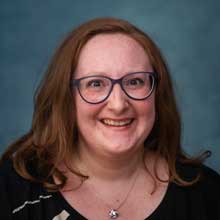
Daniela CESIRI
- Position
- Associate Professor
- Telephone
- 041 234 7829
-
daniela.cesiri@unive.it
- Scientific sector (SSD)
- Lingua, traduzione e linguistica inglese [ANGL-01/C]
- Website
-
www.unive.it/people/daniela.cesiri (personal record)
Office hours
Unless otherwise specified in the list below, Prof. Cesiri holds her office hours (ricevimento) in person in Prof. Cesiri’s office (Room 217, Palazzo Cosulich) OR via Zoom (at https://unive.zoom.us/j/86739867765?pwd=Z1QwbGNPZUxEUklsZzhwaXFHelc4UT09
Meeting ID: 867 3986 7765
Passcode: GLdk65). The schedule is as follows:
Tuesday February 24th, 2026 @ 14:00-16:00
Tuesday March 3rd, 2026 @ 14:00-16:00
Thursday March 12th, 2026 @ 10:00-12:00
Thursday March 19th, 2026 @ 10:00-12:00
Thursday March 24th, 2026 @ 14:00-16:00
Wednesday April 1st, @ 10:00-12:00
These dates may vary, so students are advised to regularly check this message in case it is modified. Later dates will be communicated in due time. For organizational reasons, students should book their meeting via email (daniela.cesiri@unive.it). In the email, students should specify their name, surname, student ID number, the date of the meeting/ricevimento, and whether they will come in person or via Zoom. Then, they will receive an answer with their allotted time during the meeting/ricevimento.
Before booking their place, students should check the online notice board for any changes to the day or time of meeting/ricevimento.
Notices
IMPORTANTE: Indicazioni per laureandi, stylesheet tesi, modulo relatrice
Published on 27/02/2026
L'argomento oggetto della prova finale va concordato con la relatrice con congruo anticipo, contattando la docente via email e fissando un incontro in uno dei ricevimenti disponibili il prima possibile (vedere apposito avviso online per calendario e modalità di ricevimento).
Una volta presi accordi con la docente e solo dopo che la stessa abbia confermato la propria disponibilità a essere la relatrice per la tesi (triennale o magistrale), è necessario compilare l'applicativo predisposto dal Dipartimento per l'individuazione della relatrice/del relatore. Gli studenti possono trovare applicativo e ulteriori precisazioni (istruzioni, scadenze, ecc.) al link: https://www.unive.it/pag/46366/. La compilazione del modulo di individuazione della relatrice NON sostituisce la domanda di laurea, da compilare seguendo modalità e scadenze indicate dall'Ateneo al link: https://www.unive.it/pag/8752/.
Inoltre, per scrivere una buona prova finale lo studente deve riservarsi almeno 3-4 mesi durante i quali dovrà svolgere un lavoro continuativo. Per questo motivo lo studente deve:
- contattare la docente con largo anticipo rispetto alla data di presentazione della domanda di laurea per prendere accordi sulla prova finale;
- compilare l'applicativo indicato al link soprastante, seguendo le scadenze prefissate dal Dipartimento;
- consegnare con regolarità via email i singoli capitoli di cui si compone l’elaborato, una volta che questi sono completati e attendere che la docente invii le correzioni via email.
- confrontarsi costantemente con la docente durante la preparazione e la stesura del lavoro di tesi, via email o durante gli orari di ricevimento.
Prima di caricare la domanda di laurea lo studente deve concordare il titolo della tesi con la docente. Per le tesi triennali non è necessario scrivere l'abstract.
Lo studente non deve sparire per lunghi periodi per poi ripresentarsi/contattare la docente via email qualche settimana, o addirittura qualche giorno, prima dalla consegna della prova finale, nè deve effettuare l'upload se prima non ha ricevuto il consenso esplicito della docente. Tantomeno, lo studente può effettuare l'upload di un lavoro che non è stato mai visto o corretto dalla docente.
Lo studente deve presentare la bozza della prova finale almeno 10 giorni prima del caricamento del PDF in Area Riservata per permettere alla docente una rilettura completa del lavoro e avere il tempo necessario per apportare eventuali modifiche o correggere eventuali errori residui.
Nella stesura della tesi lo studente dovrà seguire lo stylesheet (file .pdf) che si trova allegato al presente avviso.
Si ricorda che il plagio è un reato perseguibile a norma di legge, pertanto lo studente dovrà attenersi scrupolosamente alle indicazioni in merito contenute nello style sheet ed alle modalità di citazione e riferimenti bibliografici indicati nello stesso style sheet. Si raccomanda, inoltre, la lettura delle linee guida di Ateneo riguardanti la stesura dell'elaborato finale: http://www.unive.it/pag/31196/.

